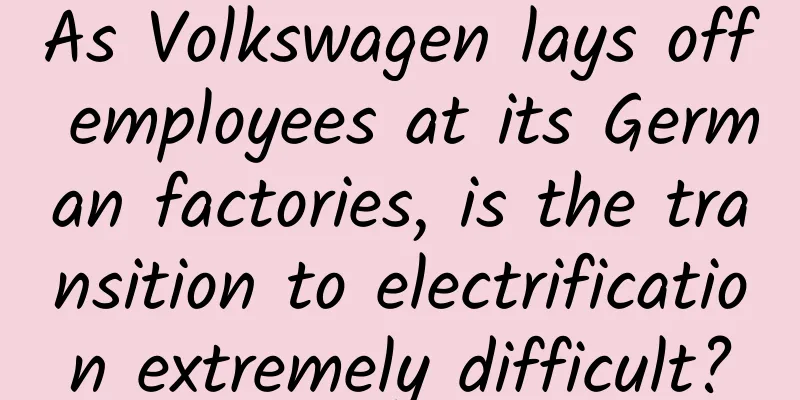As Volkswagen lays off employees at its German factories, is the transition to electrification extremely difficult?

|
The wind is blowing, so let’s lay off employees! Recently, German auto giant Volkswagen warned that its Zwickau plant in eastern Germany may lay off employees. According to foreign media reports, Volkswagen will lay off 269 employees at the plant due to "market conditions". The 12-month contracts of these employees expired recently and the company will not renew them. Worker representatives at the plant are planning to meet with Volkswagen management. The story of history is being repeated. In February this year, Ford Motor also announced that it would lay off about 11% of its employees in Europe, involving 3,800 jobs. Workers in Germany and the UK will be hit hardest, with about 2,300 and 1,300 jobs to be cut respectively in the next three years. Ford laid off employees to cut costs and transform to electric vehicles, while Volkswagen also accelerated its intelligent layout in the second half of this year while laying off employees to reduce costs and increase efficiency. Reducing costs and increasing efficiency is a choice we have to makeIt is understood that Volkswagen does not intend to renew the contracts of workers employed on fixed-term contracts at the plant. Hundreds of workers are expected to be affected by this by the end of October, out of the approximately 10,700 workers employed at the plant, of which more than 2,000 are on fixed-term contracts. In addition, union representatives wrote a letter to Volkswagen management, asking about Volkswagen's response to demand for electric vehicles and whether the plant will continue to operate on a three-shift system. Media reports said Volkswagen plans to hold an employee meeting at its Zwickau plant in Germany on Thursday local time, but did not disclose the specific details of the meeting. According to foreign media sources familiar with the matter, the decrease in electric vehicle orders in Europe is the main reason for its layoffs. At present, Volkswagen has four factories producing electric vehicles in Germany, namely Zwickau, Hanover, Dresden and Emden. In 2018, Volkswagen announced an investment of US$1.29 billion (currently about RMB 9.288 billion) to transform the Zwickau factory from producing internal combustion engine vehicles to producing electric vehicles. Although electric car manufacturing requires fewer employees than internal combustion engine cars, the plant plans to keep the number of employees stable by increasing production. Currently, the Zwickau plant mainly produces Volkswagen ID.3, ID.4 and ID.5 as well as other Volkswagen brand electric vehicles such as Audi Q4 e-tron and Cupra Born. According to Marklines data, from January to May this year, Volkswagen produced 97,000 electric vehicles in Europe, but only sold 73,000, while Tesla Model Y sales were 100,000 during the same period. Foreign media reported that the Minister of Economy of Saxony, Germany, where the Zwickau plant is located, admitted that Volkswagen is currently facing sales problems and needs to take new measures to attract potential buyers to consider German cars. He pointed out that one possible option is to encourage companies in Saxony to lease Volkswagen cars and called on Volkswagen to find new ways to increase sales. It is worth noting that Volkswagen's days in Germany have already begun to show signs of fading since the second half of this year. At the end of June, Volkswagen cut production of two models, the electric ID.4 compact SUV and the ID.7 sedan, at its Emden plant because demand was nearly 30% lower than the original planned production. The competition in the new energy vehicle market is extremely fierce, and the European economy is in a period of weakness. These external environments have made Volkswagen, which is eager to transform, feel overwhelmed and forced to resort to layoffs and other measures to achieve the goal of reducing costs to the greatest extent possible. Weak consumer demand, a fatal blow to electric vehiclesOn August 31, the preliminary statistics released by the European Statistical Office showed that the inflation rate in the euro zone in August was 5.3% on an annual basis, the same as in July. Among them, the inflation rates of the major EU economies of Germany, France, Italy and Spain in August were 6.4%, 5.7%, 5.5% and 2.4% respectively. The latest inflation data was higher than market expectations after eurozone inflation fell after peaking at 10.6% in October 2022, but the pace of decline has slowed in recent months. Under such circumstances, European governments are bound to raise interest rates, which will increase the loan costs for consumers to buy cars. Coupled with the already rising prices of new cars, consumers' demand for electric vehicles will decrease. However, judging from the sales data in the first half of this year, it does not seem pessimistic. Volkswagen Group delivered 321,600 pure electric vehicles worldwide, a year-on-year increase of 48%; of which, the European market delivered about 219,000 vehicles, accounting for 68%, a year-on-year increase of 28%. Industry analysts believe that the recovery in the first half of this year is just to fill the backlog of orders accumulated over the past year or so, and the potential sluggish demand is more challenging. According to German business daily Handelsblatt, Volkswagen's electric car sales in its home market of Germany are far below the company's expectations, and executives revealed that demand for some electric models "has dropped to zero." The industry's cautious attitude is not without reason. Although European car sales data are impressive, the market share of European car brands has continued to decline, and the strength of Tesla and Chinese brands has made them worried. In the first half of this year, new car sales in Europe reached 6.56 million, a year-on-year increase of 17%, but decreased by 1.86 million and 2.13 million respectively compared with the same period in 2019 and 2018. In addition, according to data from the European Automobile Manufacturers Association, sales of pure electric vehicles in Europe increased by 62% in July, while sales of diesel vehicles decreased by 9%. The number of pure electric vehicle registrations in Germany was 48,682, a year-on-year increase of 69%, which is the highest sales volume in the European market so far. Upon closer inspection, which brands dominate the European market? In the first half of this year, the three brands with the largest increase in market share in Europe were Tesla, MG and Skoda, with an increase of 1.3%, 0.77% and 0.55% respectively, while Fiat, Kia, Hyundai, Peugeot and Citroen suffered the most severe declines in market share. Specifically speaking of models, the best-selling electric vehicles are Tesla's Model Y and Model 3, followed by Volkswagen's ID series. In the first half of this year, Volkswagen's market share was 10.6%, down 2 percentage points from ten years ago. In the first half of 2019, Tesla's share in Europe was only 0.54%, but it has now risen to 2.82%. Volkswagen executives admitted that Tesla's price cuts were a fatal blow to the company, and orders for fuel-powered models also dropped significantly. In April this year, Tesla's price cuts spread to Europe, with the prices of all Model S and Model X models reduced by 10,000 euros, Model Y Performance reduced by 4,000 euros, Model 3 Performance reduced by 6,000 euros, Model 3 Long Range All-Wheel Drive reduced by 3,000 euros, and Model 3 Standard Range reduced by 2,000 euros. The already tight consumer demand, stimulated by Tesla's price cuts, undoubtedly diverted a lot of European consumers. It is worth noting that while Ford and Volkswagen are laying off employees, Tesla has applied for approval to expand its existing factory in Brandenburg, eastern Germany, and plans to double the production capacity of the factory in the Berlin area to 1 million vehicles per year. At the same time, the number of factory employees will increase from the current more than 10,000 to about 22,500. Chinese brands are rising, but Volkswagen’s shortcomings in smart technology are hard to overcomeTesla has set off a wave of price cuts around the world, which has had more or less impact on the development of new energy vehicles in various countries. For Volkswagen, it faces more than one strong competitor. As an important stop for Chinese car companies to go overseas, China's independent new energy brands are targeting Europe. The latest statistics released by automotive consulting firm Inovev show that so far this year, Chinese brands accounted for 8% of new electric vehicles sold in the European market, up from 6% last year and 4% in 2021. At the Munich Motor Show which just concluded, a total of 7 Chinese auto brands officially participated in the exhibition, including BYD, Leapmotor, MG, Xiaopeng, Avita, etc. In the past five years, the share of China's new energy vehicle exports to Europe in the total exports has increased significantly, from 19% in 2017 to 36% in 2022. At the auto show, Xiaopeng Motors also announced its European market expansion strategy, entering the German market this year and the French and British markets next year. At the same time, Zhejiang Leapmotor Technology also announced that it will launch five models in overseas markets including Europe in the next two years. Price and intelligence have become the core advantages of Chinese brands, which is exactly what Volkswagen lacks. According to the JatoDynamics report, the average price of electric vehicles in China in 2022 is 31,829 euros, while the average price in Europe is 55,821 euros and the United States is as high as 63,864 euros. The report believes that China's success in promoting the widespread popularity of electric vehicles is largely due to the industry's ability to produce affordable entry-level cars for the public. At the same time, the technological advantages of Chinese brands have been widely recognized. In 2022, more than one-third of new cars in China can perform assisted driving to a certain extent, and the test mileage of intelligent connected vehicles has exceeded 15,000 kilometers, and various unmanned driving scenarios have begun to be demonstrated. As a core component of electric vehicles, more than half of the top ten companies in the world in power battery sales are from China, and Chinese power battery companies have a market share of more than 60% in the global market, ranking first. The era of learning from Chinese brands has begun. In order to fill the gaps in intelligence and electrification, Volkswagen announced its cooperation with Xiaopeng in July this year, focusing on its advanced intelligent assisted driving technology. Based on the technical advantages of Xiaopeng G9's vehicle platform, intelligent cockpit and intelligent driving software, the two parties jointly developed two Volkswagen brand B-class pure electric models, and plan to start production in 2026. Recently, according to the agreement that Volkswagen CARIAD appointed the CEO of the joint venture and Horizon appointed the CTO, Horizon will transfer hundreds of people from its internal software algorithm team to the joint venture with Volkswagen. With the transfer of personnel, the size of the joint venture is expected to reach 300 people. It is reported that Huang Chang, co-founder and CTO of Horizon, has joined, and the planned business scope includes L2 assisted driving, high-speed pilot assisted driving, automatic parking and other functions. In October 2022, Volkswagen announced an investment of 2.4 billion euros to allow its software subsidiary CARIAD to establish a joint venture with Horizon, holding a 60% stake. At that time, the transaction was expected to be completed in the first half of this year, but new progress was not reported until recently. However, it is still difficult to say whether this move can fill the gap in Volkswagen's intelligence. Because as another important market for Volkswagen besides Europe, Volkswagen's performance in the Chinese market can be said to be very poor. In the first half of this year, Volkswagen's sales in China fell to 33.21%, lower than that in Europe; in the same period last year, it was 37.94%, when China was still the largest single market for the Volkswagen Group. The loss of China has caused Volkswagen to lower its sales target for 2023, and it is expected that the annual delivery volume will be between 9 million and 9.5 million vehicles. The former CEO of Volkswagen Group once admitted that it is right for German automobile companies to move closer to China and promote innovation through cooperation. The cooperation between Volkswagen and Xiaopeng, Mercedes-Benz and Geely, and BMW and Great Wall is today's new reality. If China's production industrial capabilities can be combined with Europe's brand power, it will be beneficial to both sides. Software capabilities such as smart cockpits and smart driving have always been Volkswagen's shortcomings. It will take time and opportunities for the cooperation with Horizon and Xiaopeng to translate into substantial results. As a winner of Toutiao's Qingyun Plan and Baijiahao's Bai+ Plan, the 2019 Baidu Digital Author of the Year, the Baijiahao's Most Popular Author in the Technology Field, the 2019 Sogou Technology and Culture Author, and the 2021 Baijiahao Quarterly Influential Creator, he has won many awards, including the 2013 Sohu Best Industry Media Person, the 2015 China New Media Entrepreneurship Competition Beijing Third Place, the 2015 Guangmang Experience Award, the 2015 China New Media Entrepreneurship Competition Finals Third Place, and the 2018 Baidu Dynamic Annual Powerful Celebrity. |
<<: China Passenger Car Association: Analysis of the national passenger car market in July 2022
Recommend
Live broadcast, interaction, personal IP, the trend of electric vehicle industry marketing gradually becoming fan circle can be stopped
If you stand in the right place, even a pig can f...
The pressure in the deep sea is enormous. A submarine will be crushed if it exceeds the depth. So why can deep-sea fish move freely?
If a submarine with steel and iron frames dives d...
How to choose promotion channels? Look at these 5 principles and 4 dimensions
Under the epidemic, traffic has shifted online an...
How to restore physical strength during the recovery period? Expert answers!
How to use medicine scientifically after infectio...
Let Chinese e-sports see hope, but the master said that playing professionally is more difficult than getting into Tsinghua University or Peking University
Recently, e-sports fans have received exciting go...
Increase fans! 6 practical ways to increase followers, I will teach you all of them today!
I have summarized 6 effective ways to increase fo...
Android cropper screenshot function
introduce To realize the screenshot function, you...
If you gain weight after work, it’s not your fault! You work too hard.
Planning and production Source: A Brief History E...
How to use scroll offset of ScrollView in SwiftUI
Preface Now that WWDC 24 is over, I decided to st...
Luo Yonghao reviews four flagship phones: Xiaomi's camera is not as good as Huawei's Nut R1, and the overall experience is the best
[Smart Observation Report] In the past two days, ...
After studying more than 1,000 cases, it was found that user experience design can be refined into these 12 steps
Hello everyone, this is TCC Translation Intellige...
More information about Audi's new Q3 revealed: Will it be equipped with three cylinders?
Previously, we have exposed the concept image of ...
Apple officially released iOS 9, which seems quite tempting
Fans can breathe a sigh of relief. After several ...
How can APP accurately discover users’ real needs?
Regarding user needs, there is a very famous case...
How to choose the most effective promotion channel for APP?
After the APP is launched, promoting the product ...









